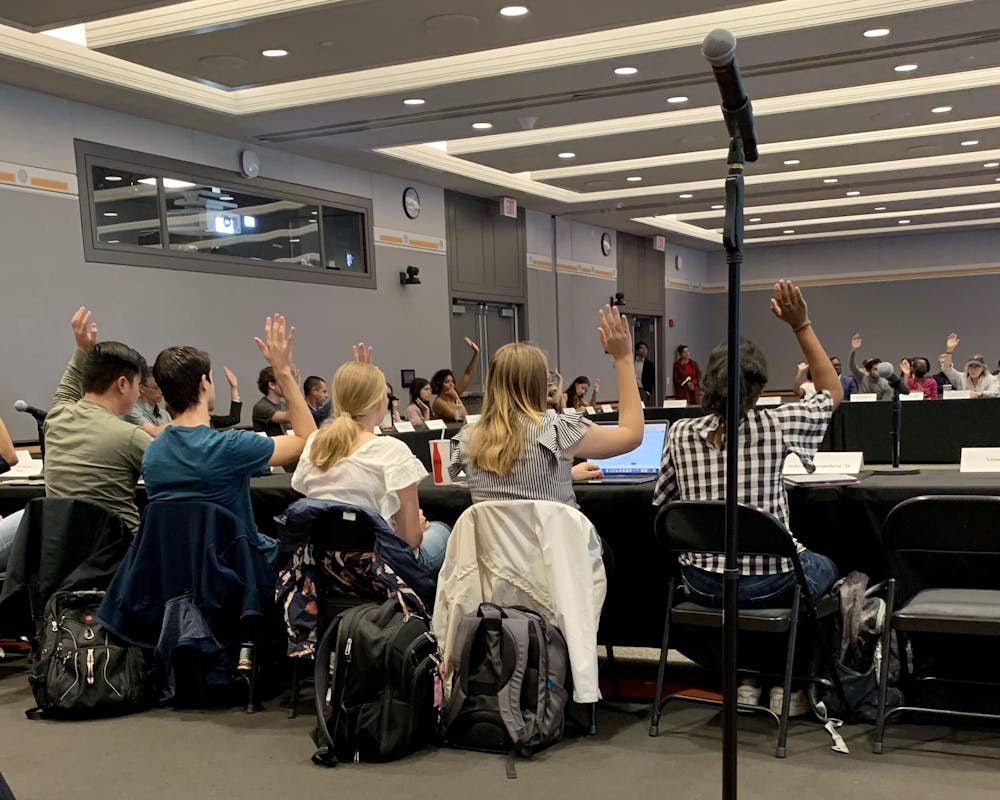After student activists began directing hard questions at President Christopher Eisgruber ’83 during meetings of the Council of the Princeton University (CPUC) in 2019, administrators pushed through a policy that curtailed freedom of attendees to ask questions. Requiring them to submit questions in advance overturned a long-standing and respected custom of holding an open question period at the end of each meeting. At the time, The Daily Princetonian Editorial Board critiqued the move as ending “open discourse” at the CPUC.
Today, the same Council may take another swing at open discourse: its Executive Committee will vote on whether to ban video recordings during meetings today. To protect transparency in one of the University’s few relatively accessible decision-making spaces, the CPUC Executive Committee must vote no.
CPUC holds six meetings a year, open to all members of the University community, to announce and discuss news, propose policies, and offer feedback in Q&A periods (which have been limited since 2019). CPUC meetings are designed to facilitate conversation on University affairs between a variety of stakeholders. Crucially, they also offer a space for students and workers to ask critical questions of administrators and demonstrate concerns with University measures; CPUC meetings are the only forums where University administrators like Eisgruber can be seen and questioned in front of the student body.
No matter the topic, all participants at the CPUC speak in a public capacity with their fellow community members. People come to the forum specifically to engage in public dialog. In this context, transparency ought to be a key value.
Yet the ban, proposed a month ago by Provost Jennifer Rexford ’91 on behalf of the Executive Committee, would encroach that transparency and curtail accountability for our most powerful decision-makers.
The right to video record is essential as a tool of accountability. Video allows journalists, activists, and spectators to capture a moment beyond what is said – it can record how someone speaks, or how someone reacts to speech. It allows those asking hard questions of people in power to record and then share their exchanges in an accessible and emotionally resonant format to a wider audience. Especially when CPUC meetings are held infrequently — only six times a year — and away from public scrutiny — few people attend the Frist basement-level meetings — video recordings of proceedings can bring to life events that might otherwise escape public attention. Although Rexford’s proposal would still permit other forms of documentation at Council meetings, such as audio recording and still photography, it disregards these particular qualities of video.
Rexford’s ban undermines the public aspects of CPUC meetings that make them so important. Given that Princeton keeps most other decision-making bodies opaque and unaccountable, CPUC meetings represent one of the last outlets for open community feedback that allow people to share concerns directly with administrators and make known their response.
Alarmingly, the video ban also violates the values of the CPUC’s own charter, whose eighth chapter declares that the CPUC “shall make no rule abridging … freedom of publication.” Given that video recording is integral to today’s publication environment, it is not clear how making a rule that abridges freedom of video recording does not count as making a rule that abridges freedom of publication. If Princeton prides itself on giving the “broadest possible latitude” for freedom of expression issues, it must continue to extend such latitude to publicization of CPUC proceedings (and, ideally, extend it to other proceedings, such as Board of Trustee meetings, which remain entirely opaque).

The administration defends the ban by claiming that it “promotes the freedom to share ideas,” as University Spokesperson Jennifer Morrill clarified in an email. Filming meeting participants, she said “has the potential to reduce the level of engagement and civil discourse.” She added that people at the meeting may feel “intimidated” and less likely to share their viewpoints when being video recorded, framing the ban as a response to doxing. Though the University’s sentiment is admirable, their timing raises questions about other motivations for its proposal. Rexford proposed the ban at the meeting after dozens of activists peacefully demonstrated at a Council meeting by holding up signs to indicate their approval or displeasure of statements by administrators — an act of protest that could only be adequately captured using videos.
It is also worth mentioning that the University is not taking action to prevent the very real acts of doxing that threaten ceasefire and pro-Palestine demonstrators in McCosh courtyard. Instead, the only place that video recording is being banned on campus is the one place where students are able to protest University decisions with administrators in the room.
Some on the Executive Committee have proposed that the ban move forward with an addition to allow for an official University video recording of proceedings. But an official recording won’t capture everything, and it leaves the University in total control of this means of information — whose dissemination could be revoked at any time. Nevertheless, a University recording could easily be implemented without Rexford’s ban.
The CPUC needs to continue as a space of open dialog and for challenging the University on its decisions. Rexford’s proposal continues a trend of curtailing transparency within meetings — one that spells bad news for anyone who cares about freedom of the press, accountability, or even the values embedded in the Council’s own charter. To our student representatives on the Executive Committee, do not allow the administration to land a new blow to open discourse on your watch. This proposal cannot move forward.

Alex Norbrook is a sophomore in the History department and a columnist for the ’Prince.‘ He can be reached at an4725[at]princeton.edu.








